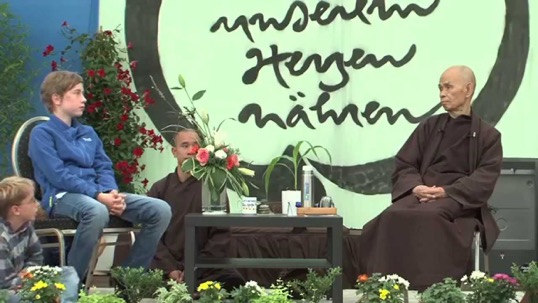Why Vegan and not Vegetarian? Vietnamese Monk Thich Nhat Hanh Answers The Question
20.09.2019 21:16 Veganism

The most heartbreaking thing to see and to witness is an innocent benevolent being getting tortured and suffering. This is the realty of eating animal products today. Billions of animals are raised for slaughter every single year, and the overwhelmingly large majority of them go through horrific and terrifying experiences. It’s hard to imagine how anybody could eat or wear the clothes of diseased animals knowing what they went through. It’s also hard to believe that anybody who does eat or purchase products that have used animals in their manufacturing process would do that kind of “labour” themselves.
The truth is that many people still don’t know what these beings are going through. It’s absolutely heartbreaking, immoral, and unethical. Morality, empathy, and love are all emotions that need to return to planet Earth, and as long as we have multiple industries exploiting animals, that can’t happen.
If you’re unaware of what these animals are going through on a daily basis, a recent PETA investigation on two of the world’s top cashmere exporters revealed extreme cruelty, including the violent killing of cashmere goats. You can read more about it and see some footage of that here, if you’re interested.
You can view more examples of graphic footage in the trailer of “The Buddha Bowl,” a documentary in the making featuring personalities and some of the most influential and renowned spiritual leaders from all over the world sharing their perspectives on veganism. These include viewpoints from Buddha himself and from spiritual leaders from the past and present, totalling about 30 interviews on animal rights, environmental issues and health.
One of the people in that documentary is Thich Nhat Hanh, a Vietnamese Buddhist monk who is recognized as a global spiritual leader, poet and peace activist. The video below is not part of the documentary listed above, but from an interview taken a few years ago at a conference.
Are We Even Designed To Eat Meat?
There is no doubt our world is becoming more awake, aware, and compassionate. Millions of people around the world have transitioned towards a plant-based diet. This represents the kind of compassion and empathy our world needs more of, and this diet can do nothing but benefit human health, the planet, and the animals.
It’s no secret that eating meat and animal products is destroying the Earth, as clearing land for animal grazing and slaughter is one of the leading causes of deforestation, and factory farms are an environmental disaster.
More people are also starting to become aware of plant-based diets and their health benefits.
A recent study conducted by researchers in California and France found that meat protein is associated with a very sharp increased risk of heart disease, while protein from nuts and seeds is actually beneficial for the human heart. The study is titled “Patterns of plant and animal protein intake are strongly associated with cardiovascular mortality: The Adventist Health Study-2 cohort,”
It’s one of many studies that’ve emerged over the years showing the benefits of plant-based diets and their ability to reverse diseases. On the other hand, many studies published have shown how the consumption of meat has the exact opposite effect.
I also go into this type of discussion, if you’re interested in reading about it, in an article I recently published: “Another Study Suggests Humans Are Not Designed To Eat Meat.”
The Takeaway
Human beings are born with compassion and empathy. What we are doing to animals on our planet today, and how many continue to ignore it and be unaffected by it, is simply as a result of mass brainwashing and marketing by big food corporations. The truth is that we’ve been taught to ignore it, we’ve been taught to believe that it’s OK and it’s our right to do this to others who share the planet with us. No child would ever stand for such a thing unless they were taught to do so. It’s the same thing as racism, we are not born with it, we are taught it. I urge all those who are reading this to do their research into where the vast majority of our food and clothes are coming from, watch what these animals are going through, look into their eyes and and feel what they are feeling.
The ability to feel and understand the emotions of others, animal or human, is a HUGE and VITAL step towards creating a better world and a better overall human experience.
Source
